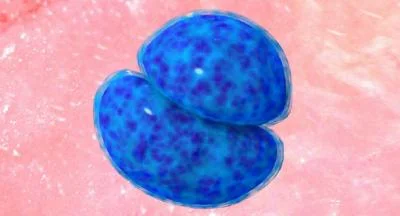Your Baby
At about the midpoint of your cycle, this is the week of ovulation, when the egg and sperm meet. If your egg is fertilized this month, your baby’s nine-month odyssey begins as a fertilized egg whose cells multiply at a dizzying rate of as many as 100,000 per minute. Filled with fluid, the blastocyst, no larger than a pinhead, divides into two. One half will become the fetus; the other attaches to the uterine wall and becomes the placenta. Within hours of fertilization, sex, eye color, and even the texture of your baby’s hair have been decided.
Your Body
Though you will likely feel nothing, as this is about the midpoint of your cycle, your ovary will be releasing an egg this week. The egg will be swept into the fallopian tube and, if in the next 24 hours one of the 350 million sperm in the average ejaculate makes the successful swim up through the uterus and into the fallopian tube to penetrate the egg, fertilization will occur. The fertilized egg will begin dividing into a cluster of identical cells as it floats down the fallopian tube to the uterus.
Do’s and Don’ts
Do be sure you get enough folic acid to prevent neural tube defects in the embryo. Folic acid needs to bepresent at the moment when an embryo’s cells curve over oneanother to create the neural tube, between the 25th and 28th dayafter conception — often before a woman knows she’s expecting. While it’s possible to get enough folic acid from diet alone, experts advise that every woman of childbearing agetake a daily supplement of 400 micrograms.
Health
Haircuts and highlights are generally thought to be safe during pregnancy, but dyeing your hair isn’t recommended during the first trimester. Ask your hair stylist about touching up your roots in a way that will see you through the next three months, or consider adding highlights instead.
Mom to Mom
Studies have shown that reducing stress can enhance your fertility. “Every night, I play guitar for half an hour after my daughter’s in bed. It’s very calming and a great way to unwind after a hectic day.” – Nancy Rones, White Plains, NY
Shopping
Shopping for a home pregnancy test? Read the fine print on the box. All home pregnancy tests look for the presence of a hormone called human chorionic gonadotropin (hCG), which is present in the blood and urine only when a woman is pregnant. Most urine tests that are available in drugstores can determine pregnancy about two weeks after ovulation, but some more sensitive tests can tell if you are pregnant as early as six days after you conceive, or one day after you miss a period. These generally cost about $10 more.
Exercise
Backaches are common during pregnancy, but if you strengthen your abdominal muscles now, you may be able to minimize them as your uterus expands. Doctors don’t advise lying on your back after the first trimester, so talk to a trainer about learning pregnancy-safe exercises that work your core.
Relationships
If you’re trying to conceive, this may be your lucky week. If you have an average 28-day cycle, chances are this is the week of ovulation. Prepare for a romance marathon; try having intercourse at least every other night this week.
Siblings
Are you hoping to conceive your third child? Pay close attention to your secondborn. Middle kids may feel left out and overlooked and may be anxious and insecure as a result. If this pattern continues, it can make a child less likely to speak up for herself.
Twins
If you’re having twins, either one egg will split this week, creating identical twins, or two eggs will be fertilized separately, creating fraternal twins.

